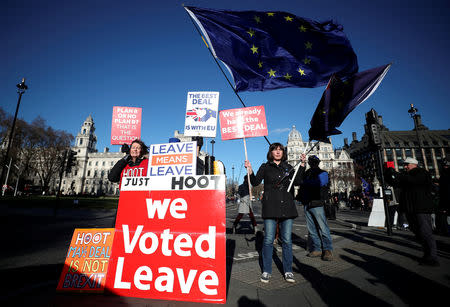EU looking for UK move on trade: Brexit negotiator

BRUSSELS (Reuters) - It is up to Britain to overcome deadlock on the Brexit deal and it should focus on shifting its stance on a future trade deal with the EU, the bloc's deputy chief negotiator Sabine Weyand said on Monday.
With just 60 days until the "default" outcome of Britain "crashing out" of the Union, she said time was tight to produce a majority in Britain behind Prime Minister Theresa May's Brexit deal or any other option to avoid that outcome on March 29.
Britain's parliament two weeks ago resoundingly defeated a withdrawal plan agreed late last year by May and the EU.
"It is quite a challenge to see how you can construct from a diversity of the opposition a positive majority for the deal," Weyand told a Brussels conference organised by the European Policy Centre think-tank.
In a note of criticism of May's strategy, she said there appeared to be a lack of "ownership" in Britain of the agreement struck between the two sides in November, and that there was insufficient transparency in the prime minister's moves.
"There will be no more negotiations on the Withdrawal Agreement," said Weyand, a German senior civil servant at the European Commission, reiterating the EU stance.
However, Weyand echoed her boss Michel Barnier in saying that Britain could resolve some of the problems caused by opposition to the so-called "Irish backstop" - designed to keep open the EU-UK land border on the island of Ireland - by changing some of its demands on post-Brexit trade.
"Where we do have margin is on the political declaration," she said, referring to the text which accompanies the withdrawal agreement, setting out mutual plans for a free trade area.
Britain remaining in a customs union, or even the EU single market, could help reach a final agreement, Weyand said, adding: "We need decisions on the UK side on the direction of travel."
Weyand said the ratification of the EU-UK deal would build the trust necessary to build a new relationship, but ruled out bowing to British calls to set a time limit to the backstop beyond which this insurance policy would lapse.
"A time-limit on the backstop defeats the purpose of the backstop because it means that once the backstop expires you stand there with no solution for this border," Weyand said.
Speaking to the same conference, a former British envoy to the EU, Ivan Rogers, said he expected the deadlock to persist in the coming weeks, saying it had always seemed likely that the outcome would remain in doubt until much closer to March 29.
Rogers was speaking in a personal capacity, having resigned two years ago after differences with May over the negotiation.
(Reporting by Gabriela Baczynska; Editing by Alastair Macdonald and Gareth Jones)

